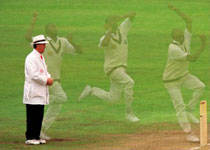Elite panel of umpires introduced by ICC
Shyam Bhatia,
India Abroad correpondent in London
The International Cricket Council has decided to create a full time, elite
panel of eight umpires to stand in 80 per cent of Test matches from next
year.
 The best umpires, selected on the basis of captains and referees' reports
and recommendations from ICC-playing committee chairman Sunil Gavaskar,
will be offered two year contracts.
The best umpires, selected on the basis of captains and referees' reports
and recommendations from ICC-playing committee chairman Sunil Gavaskar,
will be offered two year contracts.
A subsidiary group of 25 umpires -- known as the international panel -- will
be contracted to their respective cricket boards and trained to
eventually join the elite panel.
ICC president Malcolm Gray, announcing the changes at Lord's on Tuesday, said, "Players have been professionalised, administrators have been professionalised and there is a chief executive in every board,
whereas umpires and referees are still in the semi professional, semi
amateur stage."
From next year no home umpire will be allowed to stand in a Test, but the
rule will be relaxed for one-day internationals to permit one home umpire
to stand with a colleague from the international panel.
Umpires and referees will be paid with a mix of salary match fees adjusted
according to the purchasing power of the country they come from.
The ICC will also orchestrate fitness tests and a new umpiring exam to
replace the current arrangements.
The ICC's annual accounts, published for the first time ever this year,
show annual revenues of US$ 21 million and profits of US$ 6.4 million. One
of the biggest items of expenditure was the fees paid to umpires and
referees who cost the international game the equivalent of US$ 1.3 million
last year.
One item of expenditure that was on display at Lord's on Tuesday was the
US $ 42,000 silver mace that will be presented before the Edgbaston Test
next month to Aussie skipper Steve Waugh. The mace is a retrospective
trophy for the winners of the new World Test Championship.
The ICC also confirmed last Tuesday that they would move all their non-cricketing activities out of England to either Monaco, Switzerland or
Monaco to take advantage of more liberal laws on the taxation of sports
activities.